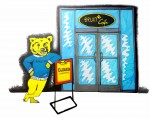In college we’re supposed to be adults; just adults who live in dorms. But we’re adults without kitchens, who can’t cook and live isolated from any sort of food establishment.
And that can be a problem, especially during Thanksgiving, winter and spring breaks when all restaurants on the Hill close. Students who remain on the Hill during these periods must resort to desperate ways of saving food, not really knowing where their next meal is coming from.
If you’re like a fair majority of on-campus students, this might not affect you too much. But there’s a large pocket of students who stay on campus during these breaks for many reasons, such as having to work or being an out-of-state student, for whom traveling home might be too expensive. If UCLA has the option for students to remain here, they should also provide food options.
As such, UCLA Dining should have one to-go restaurant remain open during breaks and provide students the option to pay extra for meals if they decide to stay over.
Since the majority of residential halls do not come with a kitchen, buying groceries during breaks becomes null since students don’t have the proper tools to cook most meals. This leaves students who stay over for breaks stuck with either stocking up on mainly junk food – like a good ol’ cup o’ noodles – or walking into Westwood to buy premade food, which can add up quickly in terms of price.
And that can lead to some bad situations. Third-year civil engineering student Paul Tarand stayed on campus during spring break like many others for work.
“I had a lot of cereal,” Tarand said. “It’s so hard to get food in Westwood. It’s heavy, and you have to walk up the hill, you know. It’s depressing.”
But this doesn’t happen at all UC’s. For example, Berkeley does not close all its restaurants during breaks. They leave one dining hall open during Thanksgiving and spring breaks to accommodate students who decide to stay over. The cost of the meal periods during these breaks are included in students’ normal meal plans, so all students living in residential halls are charged for it.
It would not be difficult to implement something similar here. Thanksgiving break is especially relevant. It’s an American holiday that international students do not celebrate. Even many out-of-state students stay on campus, since the price of flying back home for an extended weekend may be too costly. Dining halls only remain open for the first three days of this week and then close for the extended weekend. However, this full week is already included in our meal plans. As a result, many swipes this week, especially for regular meal plan holders, go to waste, even though students are really already paying for this break. So, keeping one restaurant open during this break would simply be giving students what they already paid for.
However, UCLA should not follow Berkeley’s footsteps completely – they should only charge students who are staying over breaks for these meal periods and keep a to-go restaurant like Bruin Cafe or Cafe 1919 open instead of a dining hall since those are less costly to maintain. Therefore, this would not affect students who leave campus during breaks. For Thanksgiving, this week is already included in students’ normal meal plans, so an extra charge here is not necessary. Students who stay over winter break are already charged for staying on the Hill, so this charge could be increased appropriately to include meals. Then, for spring break, students staying over should have the option to pay more for their meal plans during this week to be included.
UCLA did not provide an estimate for the cost of maintaining Bruin Cafe or Cafe 1919 for a day, but said about the issue, “UCLA’s policy is to close dining halls during breaks in order to keep overall housing costs down for students.”
“Because increasing dining service would increase costs, UCLA will review this issue carefully to ensure that possible solutions do not add a burden to students who are not participating in the program,” the statement said.
As UCLA states, it is of course important that students not remaining on the Hill during these breaks not be charged extra for meals they’re not here to eat, but this is easy to avoid. A limited option for dining halls would be the best option, since some restaurants are cheaper to maintain than others, and limited dining hours would contribute to keeping cost down for those who do choose to participate.
Since UCLA provides the option for students to remain on the Hill during these breaks, they should also provide an option to feed them. This is only fair since the majority of residential halls do not have a kitchen, so students are left with few to no options other than spending money on restaurants or junk food. This can easily be financed by giving students the option to pay more for their spring meal plan or in their payment to stay over winter break.

This article is factually incorrect. Housing does not allot any swipes for periods deemed to be holidays, whereas the opposite is implied by the author stating that swipes are somehow going to waste over the Thanksgiving Holiday. For some proof of this, take this quarter where we have Memorial Day. The dining halls will operate on a weekend schedule (i.e. no breakfast meal period is assigned for the day, just brunch). Only two swipes are allotted on the swipe schedule for that day, per this chart https://housing.ucla.edu/my-housing/rates-contracts-rules/14p-and-19p-meal-plans .